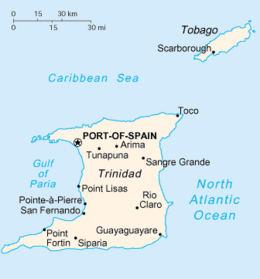Trinidad Island
| Nickname: Land of the Hummingbird | |
|---|---|

Map of Trinidad and Tobago
|
|
|
Location of Trinidad in the Lesser Antilles
|
|
| Geography | |
| Location | Windward Islands |
| Coordinates | 10°27′38″N 61°14′55″W / 10.46056°N 61.24861°WCoordinates: 10°27′38″N 61°14′55″W / 10.46056°N 61.24861°W |
| Area | 4,748 km2 (1,833 sq mi) |
| Highest elevation | 940 m (3,080 ft) |
| Highest point | El Cerro del Aripo |
| Administration | |
| Island | Trinidad |
| Capital city | Port of Spain |
| Largest settlement | Chaguanas (pop. 83,516) |
| Demographics | |
| Population | 1,267,145 (2011) |
| Pop. density | 266 /km2 (689 /sq mi) |
| Languages |
Trinidadian Standard English, Trinidadian Creole, Tobagonian Creole, Caribbean Hindustani |
| Currency | Trinidad and Tobago Dollar (TTD) |
| Religions | Christianity, Hinduism, Islam, Rastafarianism |
| Ethnic groups | Indian, African, Amerindian, European, Chinese, Arabs, Latino |
| Additional information | |
| Time zone | |
Trinidadian Standard English, Trinidadian Creole, Tobagonian Creole, Caribbean Hindustani
Trinidad is the larger and more populous of the two major islands of Trinidad and Tobago. The island lies 11 km (6.8 mi) off the northeastern coast of Venezuela and sits on the continental shelf of South America. Though geographically part of the South American continent, from a socio-economic standpoint it is often referred to as the southernmost island in the Caribbean. With an area of 4,768 km2 (1,841 sq mi), it is also the sixth largest in the West Indies.
Many believe the original name for the island in the Arawaks' language was Iëre which meant "Land of the Hummingbird". Some believe that Iere was actually a mispronunciation or corruption by early colonists of the Arawak word kairi which simply means island. Christopher Columbus renamed it "La Isla de la Trinidad" ("The Island of the Trinity"), fulfilling a vow he had made before setting out on his third voyage. This has since been shortened to Trinidad.
Caribs and Arawaks lived in Trinidad long before Christopher Columbus encountered the islands on his third voyage in 1498. Tobago changed hands between the British, French, Dutch and Courlanders, but eventually ended up in British hands. Trinidad remained Spanish until 1797, but it was largely settled by French colonists from the French Caribbean, especially Martinique. In 1889 the two islands became a single British Crown colony. Trinidad and Tobago obtained self-governance in 1958 and independence from the United Kingdom in 1962.
...
Wikipedia

